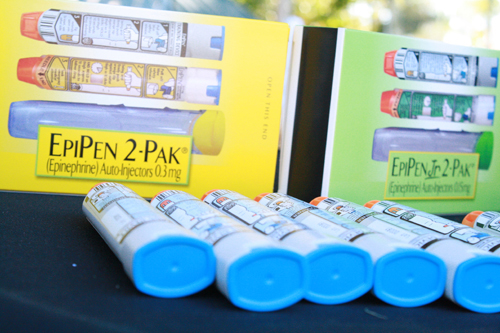New State Entity Laws Give Venues Opportunity Save Lives
Since I wrote this post in May on the historic law that makes Georgia safer for event attendees, I’m excited to be able to add 15 more states to the list of those allowing places of public accommodation (hotels, convention and conference centers, restaurants) to stock epinephrine.
If you have a family member or friend with a food allergy, you’re probably familiar with epinephrine. According to the National Institute of Allergy and Infectious Diseases (NIAID), epinephrine is used for the emergency treatment of life-threatening allergic reactions caused by allergens, whether from food or other triggers. It must be administered immediately after allergic symptoms begin and delayed use of epinephrine in allergic reactions has been associated with deaths due to anaphylaxis.
In November 2014, Walt Disney Parks and Resorts and Disney Cruise Lines signed a multi-year strategic alliance agreement with Mylan Inc. to increase awareness of anaphylaxis by stocking EpiPens® in Disney’s U.S.-based theme parks (Disneyland and Disney World) and on its cruise ships. With the agreement, updated signage in the parks and maps will highlight locations with EpiPen Auto-Injectors available in case of emergencies.
This is a landmark move for a theme park and a resort company and the first major placement of “stock epinephrine” outside of schools. Disney continues to be at the forefront in accommodating guests with food allergies. Dr. Pamela Hymel, chief medical officer for Walt Disney Parks and Resorts said, “This new strategic alliance will help raise awareness of EpiPen locations so that our Guests with severe allergies may have the best possible experience at our parks and on our cruise ships.”
 Additionally, on August 5, 2015, bipartisan legislation was introduced in the Senate to help airline travelers with severe food allergies. The Airline Access to Emergency Epinephrine Act of 2015 (S. 1972), promoted by Food Allergy Research and Education (FARE) directs:
Additionally, on August 5, 2015, bipartisan legislation was introduced in the Senate to help airline travelers with severe food allergies. The Airline Access to Emergency Epinephrine Act of 2015 (S. 1972), promoted by Food Allergy Research and Education (FARE) directs:
- The Government Accountability Office (GAO) to conduct and submit a report to Congress on air carrier policies related to passengers with food allergies. The report will cover a range of topics important to the food allergy community, including the variability of existing policies, how they are applied, how staff are trained and how passengers learn about and utilize them.
- The Federal Aviation Administration (FAA) to require airlines (domestic and foreign) to carry epinephrine auto-injectors aboard all planes and to train crew members to recognize the symptoms of anaphylaxis (an acute allergic reaction) and how to administer the medicine through auto-injectors.
- The FAA and individual airlines to clarify that the 1:1,000 epinephrine ampules currently included in medical emergency kits are intended for use during anaphylactic emergencies.
As a meeting professional, you have a duty of care to provide a safe environment for your event attendees. By having stock epinephrine at your meeting venue, just like AEDs, you’re reducing the chance of someone dying at your event.
When sourcing venues, hotels and catering partners be sure to ask them the following:
[list icon=”icon: check-square-o” icon_color=”#d81c5c”]- Do you stock epinephrine onsite and/or with your offsite catering equipment?
- Who on your staff is trained to administer the epinephrine?
- What is your emergency action plan in case someone has an allergic reaction?
- How do you manage food allergens in your kitchen and when serving guests?
During your registration process, ask attendees who state they have food allergies and other serious medical conditions to complete an emergency care plan so you have guidance on how to ensure their safety while at your event.
[/list]And, take it upon yourself to get training through the American Red Cross to recognize the signs and symptoms of anaphylaxis, know how to care for a person having a severe allergic reaction, and have the ability to administer epinephrine using an auto-injector device in case of an emergency.



